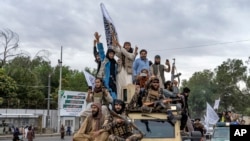The Taliban marked one year Monday since they retook power from the U.S.-backed government in Kabul, Afghanistan, seeking international partnership in bringing stability to the country which has been racked by years of war.
Fighters of the insurgent-turned-ruling group took to the streets in Afghan cities, including the capital, on motorcycles and vehicles, chanting victory slogans. A small group of them also marched past the former U.S. embassy in Kabul while raising signs.
The Taliban seized power August 15, 2021, days before U.S. and NATO troops withdrew from Afghanistan after almost 20 years of war with the insurgents
“We want to use this opportunity to have good and strong political and economic relations with all the countries of the region and the world,” Taliban Deputy Prime Minister Abdul Ghani Baradar said in a statement.
“A stable and self-sufficient Afghanistan is in the interest of all. Let’s work together to maintain and strengthen this stability,” Baradar added.
But the United Nations and foreign governments, including the U.S., renewed their calls for the Taliban to uphold commitments that would prevent Afghanistan from becoming a safe haven for terrorist groups, govern the country inclusively, and respect human rights, especially women’s rights to work and pursue an education.
“The international community will continue to expect that the Taliban meet the commitments that they have made to the Afghan people in key areas,” U.S. State Department spokesman Ned Price told reporters in Washington.
However, Price questioned the Islamist rulers’ counterterrorism assurances to the world, referring to last month’s killing of fugitive al-Qaida leader Ayman al-Zawahiri in a U.S. drone strike at his safe house in the heart of Kabul.
“We are taking a close look at the implications of that, because in terms of the Taliban’s inability or unwillingness to live up to the commitments it has made to the people of Afghanistan with regard to the rights of women and girls, this was a grave breach of the U.S.-Taliban agreement,” Price said.
The Taliban condemned the strike, saying they were not aware of al-Zawahiri’s presence in Kabul, and promised to conduct a “serious” and “comprehensive” investigation into the matter. The Islamist group also condemned the U.S. action as a violation of Afghan territory and international laws.
Taliban Foreign Minister Amir Khan Muttaqi told a gathering in Kabul Monday their government was determined not to allow any group to threaten other countries, including the U.S., from Afghan soil, saying no such incident has taken place ever since they returned to power a year ago.
Price rejected media reports as “simply wrong and not true” that the administration of U.S. President Joe Biden had decided against releasing any of the roughly $7 billion Afghan central bank foreign assets held in the United States.
Biden issued an executive order in February aimed at unfreezing half of the $7 billion for humanitarian aid to benefit the Afghan people. The rest would be held for ongoing terrorism-related lawsuits in U.S. courts against the Taliban.
“Our focus right now is on ongoing efforts to enable the $3.5 billion in licensed Afghan central bank reserves to be used precisely for the benefit of the Afghan people,” Price said.
He noted that the U.S. continues to engage Afghan central bank technocrats about measures to enhance the country’s economic macroeconomic stability.
“So right now, we’re looking at mechanisms that could be put in place to see to it that these $3.5 billion in preserved assets make their way efficiently and effectively to the people of Afghanistan in a way that doesn’t make them ripe for diversion to terrorist groups or elsewhere.”
The Afghan central bank requires those frozen funds to stabilize local currency, stem soaring inflation and encourage trade-related activities in the country.
The male-only Taliban government has banned most teenage girls from school beyond sixth grade, kept women out of most government jobs and barred them from traveling beyond 72 kilometers (45 miles) unless accompanied by a male chaperone. The hardline group defends their polices as in line with Afghan culture and Sharia — Islamic law.
The curbs on women’s access to work and education have kept the world from recognizing the Taliban government.
In addition to blocking Kabul’s access to billions of dollars in Afghan central bank assets internationally, Washington and other Western capitals have imposed economic sanctions and isolated the Afghan banking sector.
The measures have plunged the country into an economic crisis and deteriorated already bad humanitarian conditions, with millions of Afghans facing acute hunger.
Price noted Monday that the United States remains the single largest donor of humanitarian aid to Afghanistan, pledging more than $774 million over the past year.
Last Friday, he said, Washington announced an additional $150 million in funding.
“We made this point a year ago that our commitment to the people of Afghanistan …would not end upon the departure of U.S. military forces from Afghanistan. We have been able to make good on that,” Price said.




